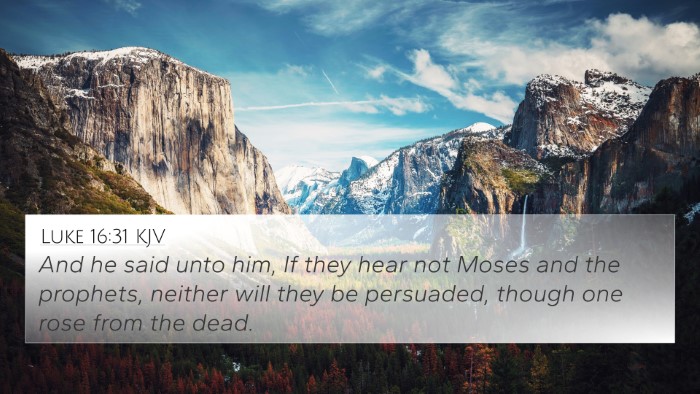Understanding John 5:47
John 5:47 states, "But if you do not believe his writings, how will you believe my words?" This verse highlights the fundamental connection between the teachings of Moses and the words of Jesus, emphasizing the importance of faith in the Scriptures as a precursor to faith in Jesus Himself.
Commentary Insights
In synthesizing insights from public domain commentaries, we can gain a broader understanding of this verse:
-
Matthew Henry: Matthew Henry points out that the rejection of Moses’ writings leads to disbelief in Christ's words. He emphasizes that the Jewish leaders held Moses in high regard while failing to recognize how his writings pointed to Christ. Their denial demonstrates a failure to understand the purpose of Moses’ laws as a foreshadowing of Christ’s coming.
-
Albert Barnes: Barnes asserts that the term "writings" refers to the entire body of the law and the prophets. He notes that Jesus challenges the Jewish authorities to acknowledge their inconsistency; they claim adherence to the Law, yet ignore its true implications that revolve around the coming Messiah. This verse serves as a call to introspect and reconcile one's beliefs with the Scriptures.
-
Adam Clarke: Clarke elaborates on the antagonistic relationship between Jesus and the religious leaders of His time. He argues that their disbelief is a direct result of their unfaithfulness to the Scriptures. Clarke highlights that unless one believes the foundational texts laid down by Moses, they cannot fully grasp the message of salvation illustrated through Jesus’ teachings.
Thematic Connections
John 5:47 raises critical discussions about the necessity of Scripture in understanding the mission and identity of Jesus. Here are significant themes and connections:
-
Faith and Scripture: The verse underscores that understanding and faith in the Old Testament Scriptures is essential for genuine faith in Christ.
-
Christ as the Fulfillment: The writings of Moses serve as a precursor to the life and work of Jesus, indicating that Jesus fulfills the very prophecy that the Jewish leaders claim to uphold.
-
Warnings Against Hypocrisy: There’s a recurring theme of hypocrisy where the Jewish leaders profess to uphold God’s laws but fail to see their connection to Jesus.
Cross-References
This verse strongly relates to several other Scriptures, highlighting the interconnectedness of biblical texts:
- Deuteronomy 18:15: Moses prophesies about a prophet like himself whom the people must listen to.
- John 1:45: Nathaniel acknowledges, “We have found him of whom Moses in the law, and the prophets, did write, Jesus of Nazareth.”
- Luke 24:27: Jesus explains to His disciples how the Scriptures point to Himself, beginning with Moses and all the prophets.
- Acts 3:22-23: Peter quotes Moses, confirming the significance of believing in Jesus as the prophet raised by God.
- Romans 10:4: Paul reminds believers that Christ is the end of the law for righteousness to everyone who believes.
- Hebrews 10:7: The author cites, "Behold, I have come to do your will, O God," connecting the Old Testament to Christ's mission.
- John 5:46: Jesus Himself states that if the leaders believed Moses, they would believe in Him as Moses wrote about Him.
Key Takeaways
In conclusion, John 5:47 emphasizes crucial themes surrounding faith, Scripture, and the fulfillment of prophecies in Christ. It serves as a reminder that:
- The Scriptures are integral to understanding Jesus' mission.
- Failure to recognize Jesus as the fulfillment of the Law leads to spiritual blindness.
- Christ’s teachings surpass the old covenant, inviting believers to a deeper relationship with God.
Tools for Bible Cross-Referencing
For those looking to deepen their study, utilizing tools for cross-referencing can enrich your understanding:
- Bible Concordance: A useful reference tool to identify specific terms and their locations within Scripture.
- Bible Cross-Reference Guide: Helpful for finding verses that correlate with themes or specific teachings.
- Cross-Reference Bible Study Methods: Various techniques can help unveil the interconnections between verses.
How to Use Cross-References Effectively
Here are some methods for utilizing cross-references:
- Identifying Themes: Look for recurring themes across the Old and New Testaments to see the bigger picture of God's plan.
- Comparative Study: Examine how different authors approach similar subjects, especially through Pauline epistles or Gospels.
- Sermon Preparation: Use cross-references to substantiate points and bring depth to homiletic material.
Conclusion
John 5:47 is a significant verse that invites believers to reflect on the authenticity of their faith in relation to the Scriptures. The connections between Jesus’ ministry and the ancient writings reinforce the importance of Scripture in modern faith. Engaging with verses in a inter-Biblical dialogue promotes a comprehensive understanding of God’s Word and the message of salvation.




